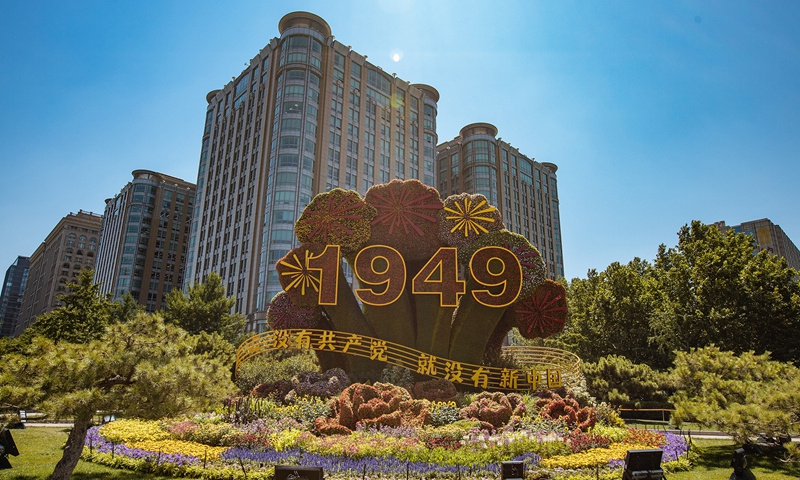
Photo:Li Hao/GT
The Communist Party of China (CPC) has changed China. What would China be like today if the country was not ruled by the CPC? It must be interesting to explore the hypothesis.
If without the CPC, Chiang Kai-shek's dictatorship would have continued after China won the War of Resistance against Japanese Aggression. There were quite a few dictatorships or power politics in Asia like this, such as those in Indonesia, the Philippines, and South Korea once upon a time. Perhaps China may have also been "democratized" at the end of the 20th century. There could be another faint possibility that China may have long ago turned into a two-party rotation system like that in India and Pakistan.
What would that scenario bring for China? Some say that China would be an enlarged version of the modernized island of Taiwan. Yet this judgment is too simplistic. Taiwan is home to 23 million people, which is almost equivalent to the population of Beijing. The total population of the Four Asian Tigers, namely South Korea, Singapore, Hong Kong and the island of Taiwan, combined, is less than 90 million. Their representativeness of the development of Asia is limited.
Taiwan, as a small island, has long faced pressure from the Chinese mainland. During the Kuomintang (KMT)'s rule, there was a strong sense of crisis on the island. Meanwhile, given the full support of the US, the island's economy soared. Taiwan island's relatively leading position in Asia occurred during the era of Chiang Kai-shek and his son Chiang Ching-kuo. Yet the long term perspective of such a leading position was very uncertain. For instance, Singapore surpassed it very suddenly. The country's geographical advantage and former prime minister Lee Kuan Yew's wisdom had brought the small country outstanding good luck. Yet it is unknown how long this luck will last.
About 2.5 billion people are living in Southeast Asia, South Asia, and on the Korean Peninsula. In the middle of the 20th century, countries in the region were roughly at the same level with China in terms of development. China is a super society with a huge population, a large number of ethnic groups, and a vast territory. The difficulty of governing the Chinese mainland is completely different from governing the small island of Taiwan. To measure China's success, one should compare it with the overall situation in Southeast Asia, South Asia, and the Korean Peninsula as a whole. Only in that way can the result be objective and fair.
China can take the US, Europe, and Japan as its next goals for further development. But a simple comparison of China and those countries and regions without taking China's history and geopolitical environment into consideration would be merely arguing for the sake of arguing. That is not a serious answer to the hypothesis raised at the beginning of the article.
The KMT has achieved a certain degree of success on Taiwan island, but it did a terrible job when it was on the Chinese mainland. Its comprehensive ability had not reached the level to govern a large society at all, it was not even close to it. The party could not handle the various separatist regimes in Chinese society at that time including those by warlords or other political forces. The authority of the central government had never been truly established. Moreover, the KMT was at a loss to resolve fundamental social problems such as land ownership and extreme social injustice. It also failed to realize genuine national independence and industrialization. As a result, a country as small as Japan conquered half of China without making too much effort.
Without the CPC, the most likely scenario for China would be a combination of the Four Asian Tigers, Southeast Asia and half of India. And it could be worse, because China might likely have gone through severe domestic chaos. China's territory could also be highly likely much smaller than it is today.
It would be almost impossible for such a China to stride toward comprehensive modernization, nor could it catch up with, get close to and may possibly surpass the US when it comes to GDP and comprehensive national strength. US troops may have been stationed in China, just like how they are in Japan and South Korea. And the US would have a strong control over China in that case. It would have 100 ways to prevent China from becoming competitive. For example, it would detonate China's ethnic controversies, indulge in the secessionism of the Xinjiang Uygur Autonomous Region and Tibet Autonomous Region, promote a polarized democracy in China, and very likely prevent China from possessing nuclear weapons, developing a powerful aerospace industry, and inventing China's own BeiDou Navigation Satellite System. The US once sanctioned India for developing nuclear weapons, but later relaxed the sanctions to take advantage of India in an attempt to balance China.
China, on the other hand, has explored an infinite space for higher and further goals, thanks to its complete independence. The CPC has mobilized the entire country and has maintained order under the circumstances of opening-up and rapid development. China does have many problems to this day, but the country, led by the CPC, has achieved a leap of the entire super society. The magnitude of China's change as well as its comprehensive and long-term implication is huge and fundamental.
It is believed that history will give the CPC's performance the highest level of rating. After all, historical evaluation will come to solid achievements that can last, rather than temporary value judgments determined by arguments in the process of pursuing achievements and the interests of small circles.
China is given a completely new look. The Chinese people's livelihoods have been reshaped. China's national competitiveness, international status and influence have taken a great leap forward. These are all solid historical accomplishments.
Granted, neither the CPC nor China should get over confident. The more successful we are, the greater pressure we are confronting. China must have the last laugh, outlive all the forces that want to bring China to its knees, or drive them mad.
The author is editor-in-chief of the Global Times. opinion@globaltimes.com.cn



